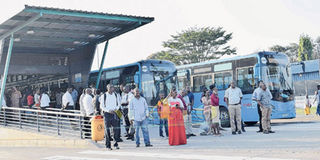Dart Agency plans to increase number of by 117pc

What you need to know:
- Dart chief executive officer Ronald Lwakatare said in a statement on Monday that by June next year there will be a total of 305 buses on the Dart infrastructure from the current 140.
The Dar es Salaam Rapid Transport (Dart) Agency plans to raise the number of buses – plying its roads – by 117 per cent in the coming seven months as it seeks to further improve commuting in the city, a senior executive has said.
Dart chief executive officer Ronald Lwakatare said in a statement on Monday that by June next year there will be a total of 305 buses on the Dart infrastructure from the current 140.
He could not divulge whether the buses will be brought by the existing operators – Uda-Rapid Transit (UDA-RT) or another operator.
Currently, according to Mr Lwakatare, a total of 200,000 commuters use Uda-RT’s buses in the city.
“With the new plan, the number of commuters will rise to between 400,000 and 500,000 per day,” he said in a statement on Monday.
The number of routes, plied by the buses will also increase, with plans that residents of Masaki, Sinza, University of Dar es Salaam and other areas will also be directly reached by the services. Currently, buses under the Dart system ply only on Kivukoni-Gerezani-Moroco and Kimara-Mwisho routes.
The Dart infrastructure was built with a loan from the World Bank.
The operator is thus expected pay a fee for operating in the roads and the government uses part of the fee in repaying the borrowed money.
Since the rapid buses started its operation, several countries from Africa including Ethiopia, Malawi, Uganda, Rwanda and Kenya has sent their representatives for the purpose of learning.
Dart Agency says in its website that it aims at having a modern public transport system at reasonable cost to users using high capacity buses that are environmentally friendly, operating on exclusive lanes and run on schedule. Its mission is to provide quality, accessible and affordable mass transport system for the residents of Dar which will subsequently enable poverty reduction improve standard of living lead to sustainable economic growth, and act as a pioneer of private and public investment partnership in public transport.
Its objectives include to increase the level of mobility of majority of residents enhancing their participation in a wide range of activities.



